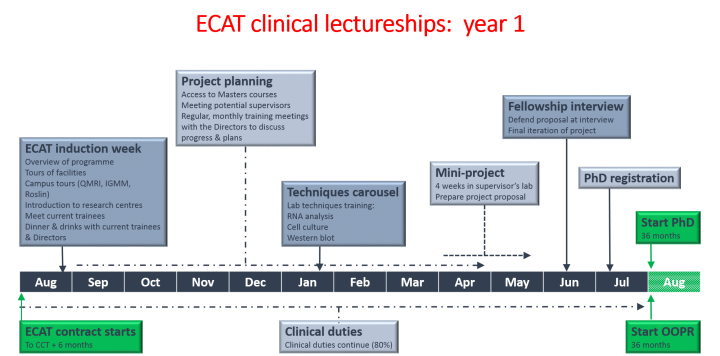ECAT clinical lectureships & PhD fellowships
There are two types of post on offer: ECAT clinical lectureships and ECAT PhD fellowships. Find out here how they differ.
At the core of the programme are ECAT clinical lectureships. Eligible candidates must hold a National Training Number (NTN) in their clinical discipline, typically awarded at ST3 (but not exclusively). After rigorous selection, successful candidates take up their post as a NES/UoE clinical lecturer in August, with inter-deanery transfer of training facilitated when necessary by the Postgraduate Dean.
In the first year (see Figure), ECAT lecturers use 20% protected academic time to facilitate an optimal PhD choice without delaying their clinical training trajectory, including:
• an induction week with a physical and intellectual tour of the multi-disciplinary research centres;
• identifying and meeting potential supervisors, attending courses and accessing (optional) MSc modules;
• attending monthly meetings with ECAT directors where innovative choices in PhD supervisor selection and project development are encouraged;
• undertaking a one month mini-project with their chosen supervisor, before defending their PhD proposal at a panel meeting (styled on the Wellcome Trust RTF interview panel). After the panel meeting any recommended iteration of the project is fed back to the candidate and supervisors. A final version is submitted for approval and then trainees are released from clinical training by the Deanery to begin a full-time-equivalent 3-year PhD.

This pragmatic approach provides a 4-year PhD experience within a 1+3 model, compatible with ongoing clinical training, allowing us to expose candidates to supervisors and settings of scientific excellence not normally accessed by medically qualified graduates.
After their PhD, trainees return to clinical training as clinical lecturers, with protected academic time until CCT. This guarantees onward mentored clinical and academic training to facilitate successful application for intermediate fellowships. Postdoctoral research training outside Edinburgh is strongly encouraged during the intermediate fellowship.
ECAT PhD fellowships
For some individuals, ECAT lectureships are not the 'best fit' for professional or personal reasons. To increase flexibility and access to the ECAT scheme, we use co-investment of University endowment funds to enable ECAT PhD fellowships. Eligible candidates must hold a National Training Number in their chosen clinical discipline and will return to their training programme on completion of the PhD.
On taking up an ECAT PhD fellowship, successful candidates immediately go out-of-programme and into full-time pre-doctoral research for three months (see diagram). This timing ensures they benefit from the introductory week in August, and involves more frequent mentorship meetings with ECAT directors to select two or three diverse mini-projects with prospective supervisors. Within three months, a full PhD proposal is written and defended at a panel meeting (see above) before any iteration is completed and the document submitted for approval. Appointees then proceed directly into their 3-year PhD. After their PhD, the opportunity still exists for progression to a clinical lectureship, exploiting the flexibility we have in allocating such posts.


